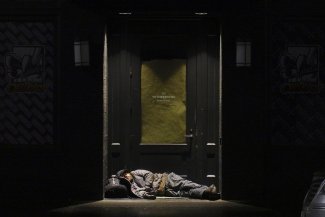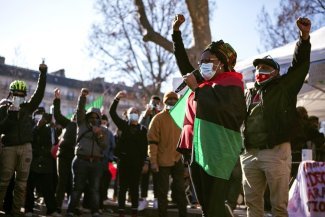On 23 March 2020, at the beginning of Italy’s coronavirus lockdown, two homeless people walk in a deserted street in downtown Bologna.
As lockdowns were introduced across Europe at the beginning of the coronavirus pandemic, the critical importance of the right to housing and its link to health and security became clearer than ever. For many homeless people, however, it remained a distant privilege.
Before the pandemic, Anna and Marco (not their real names), a young Italian couple from Bologna, both had work and housing. But after being laid off from their jobs because of the lockdown, they could no longer pay their rent and joined the estimated 50,000 people defined as homeless living across Italy. In March 2020, a strict stay-at-home order was introduced across the country, with police issuing fines to anyone who was found outside of their home without a valid reason. Anna and Marco decided to seek help at a Caritas shelter just outside of Bologna, where couples were being accepted. On their way there, they were stopped and fined by police for breaking lockdown rules.
“How could a homeless person stay at home?” asks Antonio Mumolo, president of Avvocato di Strada (meaning ‘Street Lawyer’), an Italian NGO that offers free legal protection to homeless people in Italy.
Mumolo and a colleague took on Anna and Marco’s case. Following Avvocato di Strada’s appeal, the Prefect of Bologna cancelled the fines on the grounds that the couple’s actions were legitimate.
Anna and Marco weren’t the only people without housing fined during the pandemic. “Apart from fines, the problems homeless people face didn’t change from before,” says Mumolo. Divorces, evictions, poor access to welfare services, administrative impasses due to the lack of a registered address – which are all legal issues Avvocato di Strada has dealt with since its foundation – were only amplified by the added strain of the pandemic. “If anything, there’s more poverty,” says Mumolo.
Born out of “a great hunger for rights”
The history of Avvocato di Strada dates back to 1993, when Mumolo was volunteering on the streets of Bologna, Italy, to provide assistance to the city’s unhoused population. An outreach worker by night, Mumolo was a solicitor specialising in labour law by day. During his evening shifts, as he distributed warm food and blankets, people would ask him for legal advice on a host of different issues. “I realised that on the streets there was also a great hunger for rights,” says Mumolo.
The requests varied from advice on fines and evictions to employment issues, but one frequently seemed the most pressing: the lack of a registered address and the associated administrative repercussions. It is estimated that one-third of homeless people in Italy do not have access to an address even though a registered address is a gateway to the fundamental social rights enshrined in the Italian constitution. Without one, a person cannot register for a general practitioner, cannot vote, cannot renew an ID card, and crucially, cannot access basic welfare services or state-funded legal services.
Losing a registered address follows a typical pattern, says Mumolo. “A person gets evicted and ends up on the street. Someone else moves in and takes over the address.” Once the ‘comune’ (the municipal administration) realises that its records need updating, they delete the old civil registry records and, effectively, ‘cancel’ those who have no new fixed abode. “People become invisible and cannot get off the streets,” he points out.
Mumolo decided to put his legal expertise to good use, and began to help homeless people by creating Avvocato di Strada and representing those whose access to legal advice has been by their administrative status. At first, he started with just one colleague. Then, from a small helpdesk in Bologna, the organisation soon grew in number and reach. Almost 30 years later, Avvocato di Strada operates in 55 Italian cities, with 1,075 solicitors. “We are the biggest legal practice in Italy,” jokes Mumolo.
Virtual addresses, real obstacles
Via Mariano Tuccella in Bologna is a street that doesn’t physically exist. Nor does Via Modesta Valenti in Rome. They are both virtual addresses, named after two people without housing who died on the streets. Over 200 municipalities across Italy have set up virtual streets that are territorially non-existent, but equivalent in legal value, to open the door to basic constitutional rights for people who have no permanent address.
Although there are differences in scale and form, the idea that the unhoused need a temporary address to help them access their social rights is not unique to Italy. In Belgium, since 1997 homeless people have been able to register for what is known as a ‘reference address’ with the support of the Public Centre for Social Welfare, and in the UK, ProxyAddress is running a pilot scheme that allows homeless people to ‘borrow’ the address of a vacant property for up to six months to allow individuals to access vital support and services.
Not all Italian municipalities, however, are willing to establish virtual street addresses. Research conducted by Avvocato di Strada in 2019 shows the many barriers that the unhoused face. For example, out of the 302 municipalities interviewed, 175 didn’t give Avvocato di Strada any details when asked about their address procedures. Some didn’t even answer the phone, a striking example of how frustrating it can be for homeless people to open a channel of communication with institutions.
People without housing then face additional barriers when trying to establish a virtual address, such as requests from the municipality for proof of income or ID, which can be impossible for some people to access. When an unhoused person goes to the civil registry, sometimes they are not even offered the documents needed to start an address application.
That’s where Avvocato di Strada steps in. Sometimes the process of registering a virtual address is very straight-forward: the sole presence of a lawyer is enough to start the bureaucratic machine. Other times, Avvocato di Strada is forced to open a lawsuit against the municipality.
“G. toured the city’s services offices, full of useless bureaucracy, without managing to obtain a registered address, one of his essential rights,” recalls one Avvocato di Strada volunteer. “He was really exhausted and disheartened when he came to us.” However, in a short amount of time, volunteers helped him to obtain a virtual address. “Once again he has the right to vote, to access medical care.”
In another example, a homeless asylum seeker with a chronic, potentially life-threatening illness, was struggling to get treatment. Like so many other people living on the streets, the only place that Mohamed could access healthcare was the accident and emergency department, which meant that his diabetes was often going untreated. When volunteer Olivia first met him, Mohamed had just applied for political asylum but he still didn’t have a registered address. “He was very worried about not being able to get enough insulin,” recalls Olivia. “After a long bureaucratic process, Mohamed got an address and his insulin.”
Problems magnified by the pandemic
The fifth overview of Housing Exclusion in Europe, conducted by France’s Pierre Abbé Foundation and the European Federation of National Organisations Working with the Homeless (FEANTSA), shows that over the last decade the social makeup of Europe’s homeless population has changed. It is no longer overwhelmingly made up of single men, but now also includes older people of all genders whose pensions are too low, people who have been evicted, people who have experienced a divorce, the working poor, and migrants who are shut out of access to social services.
The coronavirus pandemic has only magnified the problems that homeless people already faced, and is likely to increase the number of rough sleepers across Europe due to soaring unemployment rates. In Italy, an increase in the number of individuals facing absolute poverty – up one million according to recent research from the Italian National Institute of Statistics – means that similar shifts are occuring there.
Adding to pre-existing issues of poverty and housing exclusion, homeless people have been more exposed not only to increased health risks from Covid-19, but also to lockdown-related fines.
When other cases similar to Anna and Marco’s were reported to Avvocato di Strada, the NGO wrote to the prime minister, regional governors and local mayors, asking them not to fine the unhoused but to give them access to shelter and a doctor. “If you don’t do it out of solidarity, do it out of selfishness,” says Mumolo, “because when a person gets sick, they become a vehicle of infection for everyone.”
Avvocato di Strada has won all of the fine-related cases that it has challenged since the start of the lockdown. Not because fines connected to lockdown measures are wrong, but because in such cases as Anna and Marco’s, the enforcement lacks understanding of the circumstances (i.e., rough sleepers cannot possibly respect lockdown measures because they do not have a home to be ‘locked down’ in).
Reinserting the unhoused into the socio-economic fabric of the wider community, as well as ensuring that everyone has access to healthcare and housing, is the end goal of Avvocato di Strada and its sister associations across Europe. “With targeted social strategies we can end homelessness,” says Mumolo. But first, “you need a lawyer to help you get out of the street,” he says.













